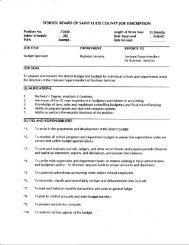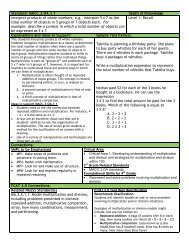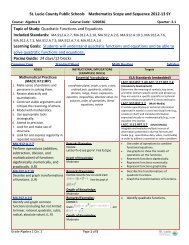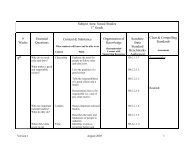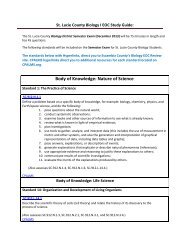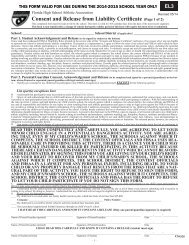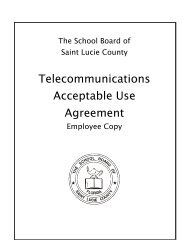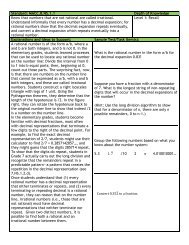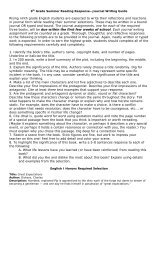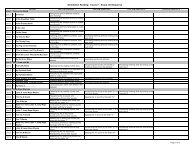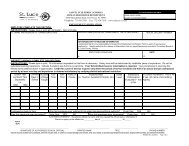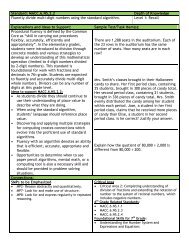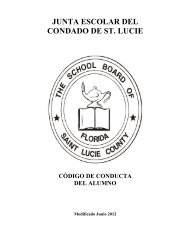Learning Map 4 Domains
Learning Map 4 Domains
Learning Map 4 Domains
You also want an ePaper? Increase the reach of your titles
YUMPU automatically turns print PDFs into web optimized ePapers that Google loves.
Marzano Art and Science of Teaching Teacher Evaluation Model<br />
<strong>Learning</strong> <strong>Map</strong><br />
Domain 1: Classroom Strategies and Behaviors<br />
Lesson Segments<br />
Involving Routine Events<br />
Lesson Segments<br />
Addressing Content<br />
Lesson Segments<br />
Enacted on the Spot<br />
DQ1: Communicating<br />
<strong>Learning</strong> Goals and<br />
Feedback<br />
1. Providing Clear<br />
<strong>Learning</strong> Goals and<br />
Scales (Rubrics)<br />
2. Tracking Student<br />
Progress<br />
3. Celebrating Success<br />
DQ6: Establishing<br />
Rules and Procedures<br />
4. Establishing Classroom<br />
Routines<br />
5. Organizing the Physical<br />
Layout of the<br />
Classroom<br />
Note: DQ referrers to Design<br />
Questions in the Marzano Art and<br />
Science of Teaching Framework.<br />
The nine (9) DQs organize the 41<br />
elements in Domain 1.<br />
The final Design Question, DQ10:<br />
Developing Effective Lessons<br />
Organized into a Cohesive Unit is<br />
contained in Domain 2: Planning<br />
and Preparing.<br />
DQ2: Helping Students Interact with<br />
New Knowledge<br />
6. Identifying Critical Information<br />
7. Organizing Students to Interact with New<br />
Knowledge<br />
8. Previewing New Content<br />
9. Chunking Content into “Digestible Bites”<br />
10. Processing of New Information<br />
11. Elaborating on New Information<br />
12. Recording and Representing Knowledge<br />
13. Reflecting on <strong>Learning</strong><br />
DQ3: Helping Students Practice and Deepen<br />
New Knowledge<br />
14. Reviewing Content<br />
15. Organizing Students to Practice and<br />
Deepen Knowledge<br />
16. Using Homework<br />
17. Examining Similarities and Differences<br />
18. Examining Errors in Reasoning<br />
19. Practicing Skills, Strategies, and Processes<br />
20. Revising Knowledge<br />
DQ4: Helping Students Generate and Test<br />
Hypotheses<br />
21. Organizing Students for Cognitively<br />
Complex Tasks<br />
22. Engaging Students in Cognitively Complex<br />
Tasks Involving Hypothesis Generation and<br />
Testing<br />
23. Providing Resources and Guidance<br />
DQ5: Engaging Students<br />
24. Noticing When Students are Not Engaged<br />
25. Using Academic Games<br />
26. Managing Response Rates<br />
27. Using Physical Movement<br />
28. Maintaining a Lively Pace<br />
29. Demonstrating Intensity and Enthusiasm<br />
30. Using Friendly Controversy<br />
31. Providing Opportunities for Students to Talk about<br />
Themselves<br />
32. Presenting Unusual or Intriguing Information<br />
DQ7: Recognizing Adherence to<br />
Rules and Procedures<br />
33. Demonstrating “Withitness”<br />
34. Applying Consequences for Lack of Adherence to Rules<br />
and Procedures<br />
35. Acknowledging Adherence to Rules and Procedures<br />
DQ8: Establishing and Maintaining Effective Relationships<br />
with Students<br />
36. Understanding Students’ Interests and Background<br />
37. Using Verbal and Nonverbal Behaviors that Indicate<br />
Affection for Students<br />
38. Displaying Objectivity and Control<br />
DQ9: Communicating High Expectations for<br />
All Students<br />
39. Demonstrating Value and Respect for Low Expectancy<br />
Students<br />
40. Asking Questions of Low Expectancy Students<br />
41. Probing Incorrect Answers with Low Expectancy Students<br />
©2011 Robert J. Marzano. Can only be digitized in iObservation. Page 1<br />
iObservation is a registered trademark of <strong>Learning</strong> Sciences International®<br />
www.MarzanoEvaluation.com
Marzano Art and Science of Teaching Teacher Evaluation Model<br />
<strong>Learning</strong> <strong>Map</strong><br />
Domain 2: Planning and Preparing Domain 3: Reflecting on Teaching Domain 4: Collegiality and Professionalism<br />
Planning and Preparing<br />
Reflecting on Teaching<br />
Collegiality and Professionalism<br />
Planning and Preparing for<br />
Lessons and Units<br />
42. Effective Scaffolding of<br />
Information with Lessons<br />
43. Lessons within Units<br />
44. Attention to Established<br />
Content Standards<br />
Planning and Preparing for<br />
Use of Resources and Technology<br />
45. Use of Available Traditional<br />
Resources<br />
46. Use of Available Technology<br />
Planning and Preparing for the<br />
Needs of English Language Learners<br />
47. Needs of English Language<br />
Learners<br />
Evaluating Personal Performance<br />
50. Identifying Areas of<br />
Pedagogical Strength and<br />
Weakness<br />
51. Evaluating the Effectiveness of<br />
Individual Lessons and Units<br />
52. Evaluating the Effectiveness of<br />
Specific Pedagogical Strategies<br />
and Behaviors<br />
Developing and Implementing a<br />
Professional Growth Plan<br />
53. Developing a Written Growth<br />
and Development Plan<br />
54. Monitoring Progress Relative to<br />
the Professional Growth and<br />
Development Plan<br />
Promoting a Positive Environment<br />
55. Promoting Positive Interactions<br />
with Colleagues<br />
56. Promoting Positive Interactions<br />
about Students and Parents<br />
Promoting Exchange of<br />
Ideas and Strategies<br />
57. Seeking Mentorship for Areas of<br />
Need or Interest<br />
58. Mentoring Other Teachers and<br />
Sharing Ideas and Strategies<br />
Promoting District and School<br />
Development<br />
59. Adhering to District and School<br />
Rule and Procedures<br />
60. Participating in District and<br />
School Initiatives<br />
Planning and Preparing for the<br />
Needs of Students Receiving Special<br />
Education<br />
48. Needs of Students Receiving<br />
Special Education<br />
Planning and Preparing for the<br />
Needs of Students Who Lack<br />
Support for Schooling<br />
49. Needs of Students Who Lack<br />
Support for Schooling<br />
©2011 Robert J. Marzano. Can only be digitized in iObservation. Page 2<br />
iObservation is a registered trademark of <strong>Learning</strong> Sciences International®<br />
www.MarzanoEvaluation.com



